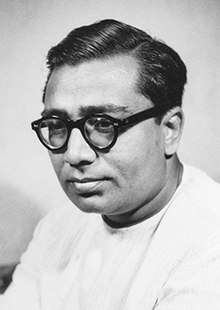Jayanti Dalal
Jayanti Ghelabhai Dalal (18 November 1909 – 24 August 1970) was an Indian author, publisher, stage actor, director and politician. Born in family of theatre organiser and involved in politics during and after independence of India, he was influenced by socialism and Gandhian philosophy. He wrote one-act plays, short stories and edited publications.
Jayanti Dalal | |
|---|---|
 | |
| Born | Jayanti Ghelabhai Dalal 18 November 1909 Ahmedabad |
| Died | 24 August 1970 (aged 60) |
| Notable awards | Ranjitram Suvarna Chandrak |
| Relatives | Ghelabhai (father) |
Life
Jayanti Dalal was born on 18 November 1909 at Ahmedabad. His father Ghelabhai was organiser of Deshi Natak Samaj, a theatre group.[1][2][3] So he had his primary and secondary education at various places. He completed his matriculation in 1925 and joined Gujarat College for further studies. He left studies in 1930 when he was in final year of Bachelor of Arts as he participated in Indian independence movement.[2][3][1]
He started publishing house in 1939 and published until his death. He was involved in Mahagujarat Movement in 1956 helping Indulal Yagnik and he published Navgujarat daily during that period. He was elected to Bombay state assembly in 1957. In 1962, he again contested but lost the election. He died in Ahmedabad on 24 August 1970.[2][3][4][1]
Alongside his political career, he directed and acted in the amateur theatre group Rangmandal.[1]
Works
Plays
He is known for his one-act plays.[1] They were innovative, related to life and filled with thoughtful and satirical dialogues. His childhood experiences with his father's stage play company impacted his brilliance in plays. Some of his popular plays are Soi nu Naku, Draupadi no Sahkar (1950), Jeevandeep (1940) and Joiye Chhe, Joiye Chhiye. His one-act play collections are Javanika (1941), Pravesh Bijo (1950), Pravesh Trijo (1953) and Chotho Pravesh (1957). Rangtoran is collection of children's plays while Avataran (1949) is a three-act play.[2][3][4][5] Kaya Lakdani, Maya Lugdani (Bodies of Wood, Fascination for Clothes, 1963) is a treatise on stagecraft and plays showing his attitude towards the theatre production.[6][7][1] His plays are collected in 'Javnika' (Curtain, 1941) and 'Pravesh' (Entry, four volumes, 1950–7).[1]
Editing
He edited magazines on theater and literature, Rekha (1939-1940) and Ekanki (1951). He also edited Gati weekly and later Navgujarat (New Gujarat, 1956) daily during Mahagujarat movement.[2][3][8][1] He edited the complete works of Dahyabhai Jhaveri.[1]
He edited cinema magazine based in Delhi and also produced Gujarati film Bikhare Moti in 1935.[2][3]
Others
He wrote short stories and novels also. Dhimu ane Vibha is an example of his innovative stories which focus more on psychological aspect of lead character than external world.[2][3][8] His stories like Junu Chhapu (1939) and Agiyar ne Panch (1944) are influenced by existentialism.[5] Padar na Teerath (1946) is about political climate of India in 1942 including Quit India movement.[9][10][11] Adkhe Padkhe is his short story collection.[12] He translated War and Peace by Leo Tolstoy in Gujarati.[13]
Awards
He was awarded Ranjitram Suvarna Chandrak in 1959 and Narmad Suvarna Chandrak for his contributions in field of literature.[3]
Further reading
- Jayanti Dalāla śatābdī-vandanā (in Gujarati). Sāhitya Akādemī. 2010. ISBN 978-81-260-2820-7.
- Raghuveer Chaudhari (1981). Jayanti Dalal. Kumakuma Prakāśana.
References
- Baradi, Hasmukh (2004). "Dalal, Jayanti (1909–70): Gujarati playwright, publisher, activist.". In Lal, Ananda (ed.). Oxford Companion to Indian Theatre. Oxford University Press. doi:10.1093/acref/9780195644463.001.0001. ISBN 9780195644463 – via Oxford Reference. (subscription required)
- Amaresh Datta (1987). Encyclopaedia of Indian Literature: A-Devo. Sahitya Akademi. p. 838. ISBN 978-81-260-1803-1.
- "જયંતિ ઘેલાભાઈ દલાલ". Gujarati Sahitya Parishad (in Gujarati). 4 September 2014.
- The Indian P.E.N., P.E.N. All-India Centre., 1970, p. 299
- K. M. George (1992). Modern Indian Literature, an Anthology: Plays and prose. Sahitya Akademi. p. 187. ISBN 978-81-7201-783-5.
- Nagendra (1988). Indian Literature. Prabhat Prakashan. p. 332.
- Nalini Natarajan; Emmanuel Sampath Nelson (1 January 1996). Handbook of Twentieth-century Literatures of India. Greenwood Publishing Group. p. 116. ISBN 978-0-313-28778-7.
- Smt. Hiralaxmi Navanitbhai Shah Dhanya Gurjari Kendra (2007). Gujarat. Gujarat Vishvakosh Trust. pp. 378, 417.
- Yogendra Kumar Malik; Carl Lieberman (1975). Politics and the Novel in India. Brill Archive. p. 116. ISBN 90-04-04243-1.
- Andrea L. Stanton; Edward Ramsamy; Peter J. Seybolt; Carolyn M. Elliott (5 January 2012). Cultural Sociology of the Middle East, Asia, and Africa: An Encyclopedia. SAGE Publications. p. 243. ISBN 978-1-4522-6662-6.
- Sisir Kumar Das (1 January 1995). History of Indian Literature: 1911-1956, struggle for freedom : triumph and tragedy. Sahitya Akademi. p. 774. ISBN 978-81-7201-798-9.
- Indian Literature. Sähitya Akademi. 1966. p. 35.
- Jagmohan, Sarla (1 January 2002). Selected Stories from Gujarat. Jaico Publishing House. p. 9. ISBN 978-81-7224-955-7. Retrieved 25 April 2017.